Business Ethics: Case Study of Pesticide Export Practices
VerifiedAdded on 2023/01/05
|9
|2266
|98
Case Study
AI Summary
This case study analyzes the ethical implications of exporting pesticides to developing nations, focusing on a scenario where U.S. companies export banned or severely restricted pesticides. The paper examines the actions of Velsicol Chemical Corporation and the ethical issues arising from these practices. It identifies the stakeholders involved, including suppliers, farmers, and government agencies like the EPA, USDA, and FDA. The analysis applies ethical theories such as Rawl's Principles of Distributive Justice, Utilitarian theory and Blackstone theory to evaluate the situation. The paper explores the responsibilities of various parties and suggests solutions such as banning hazardous chemical production, implementing stricter regulations, and promoting sustainable business practices to mitigate the negative impacts on workers and the environment. The conclusion emphasizes the need for a multidisciplinary approach to chemical management and the importance of international cooperation to address the issue effectively.
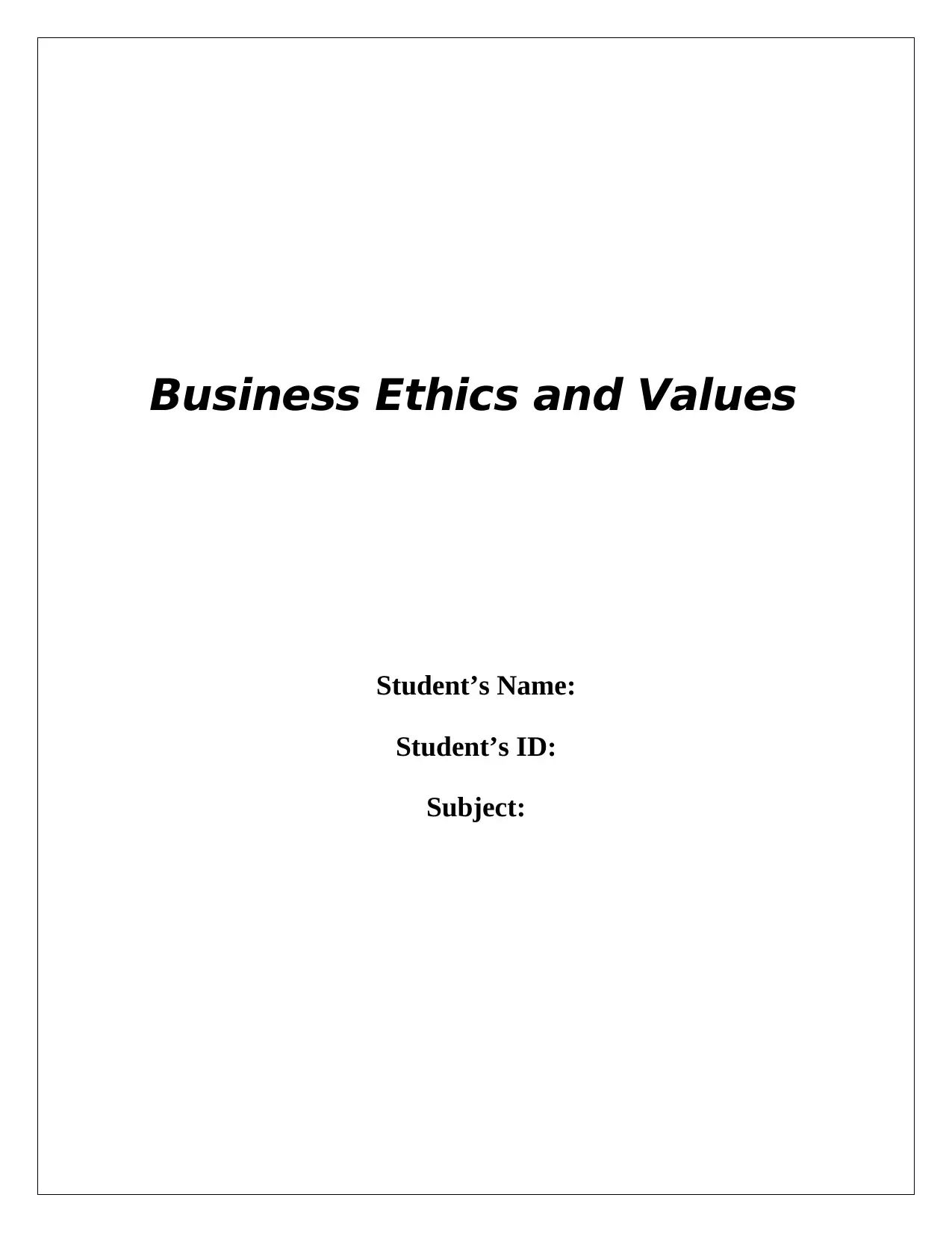
Business Ethics and Values
Student’s Name:
Student’s ID:
Subject:
Student’s Name:
Student’s ID:
Subject:
Paraphrase This Document
Need a fresh take? Get an instant paraphrase of this document with our AI Paraphraser
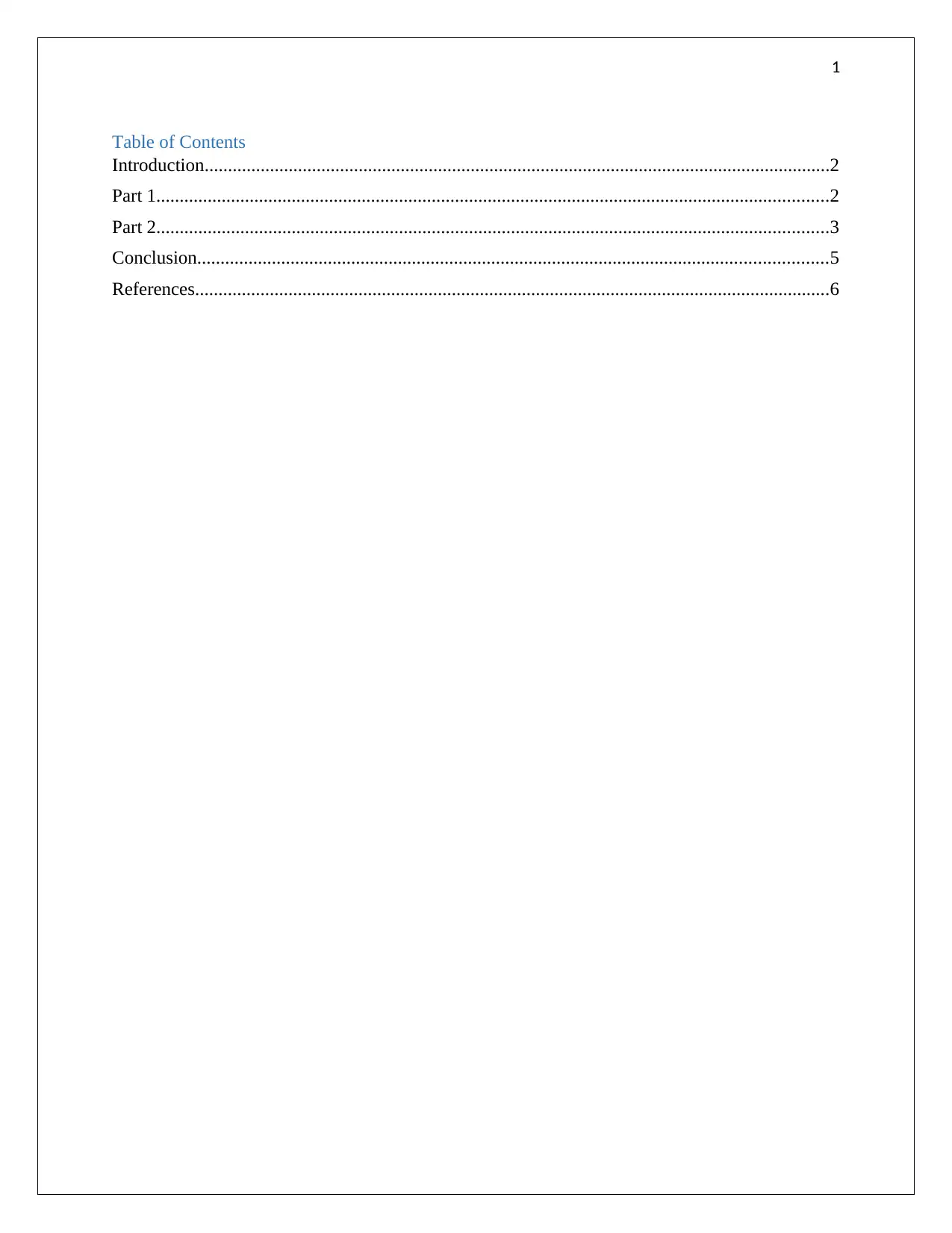
1
Table of Contents
Introduction......................................................................................................................................2
Part 1................................................................................................................................................2
Part 2................................................................................................................................................3
Conclusion.......................................................................................................................................5
References........................................................................................................................................6
Table of Contents
Introduction......................................................................................................................................2
Part 1................................................................................................................................................2
Part 2................................................................................................................................................3
Conclusion.......................................................................................................................................5
References........................................................................................................................................6
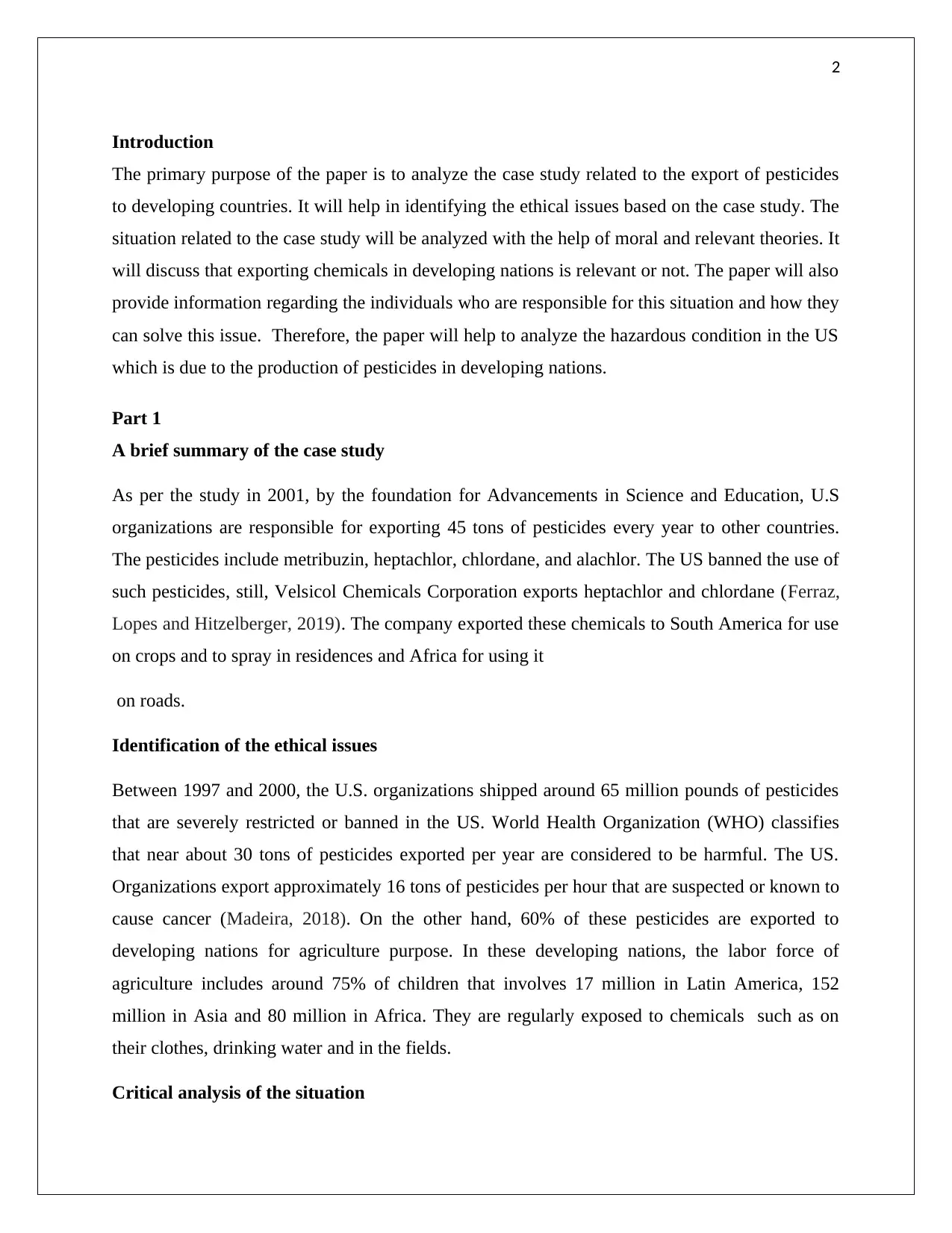
2
Introduction
The primary purpose of the paper is to analyze the case study related to the export of pesticides
to developing countries. It will help in identifying the ethical issues based on the case study. The
situation related to the case study will be analyzed with the help of moral and relevant theories. It
will discuss that exporting chemicals in developing nations is relevant or not. The paper will also
provide information regarding the individuals who are responsible for this situation and how they
can solve this issue. Therefore, the paper will help to analyze the hazardous condition in the US
which is due to the production of pesticides in developing nations.
Part 1
A brief summary of the case study
As per the study in 2001, by the foundation for Advancements in Science and Education, U.S
organizations are responsible for exporting 45 tons of pesticides every year to other countries.
The pesticides include metribuzin, heptachlor, chlordane, and alachlor. The US banned the use of
such pesticides, still, Velsicol Chemicals Corporation exports heptachlor and chlordane (Ferraz,
Lopes and Hitzelberger, 2019). The company exported these chemicals to South America for use
on crops and to spray in residences and Africa for using it
on roads.
Identification of the ethical issues
Between 1997 and 2000, the U.S. organizations shipped around 65 million pounds of pesticides
that are severely restricted or banned in the US. World Health Organization (WHO) classifies
that near about 30 tons of pesticides exported per year are considered to be harmful. The US.
Organizations export approximately 16 tons of pesticides per hour that are suspected or known to
cause cancer (Madeira, 2018). On the other hand, 60% of these pesticides are exported to
developing nations for agriculture purpose. In these developing nations, the labor force of
agriculture includes around 75% of children that involves 17 million in Latin America, 152
million in Asia and 80 million in Africa. They are regularly exposed to chemicals such as on
their clothes, drinking water and in the fields.
Critical analysis of the situation
Introduction
The primary purpose of the paper is to analyze the case study related to the export of pesticides
to developing countries. It will help in identifying the ethical issues based on the case study. The
situation related to the case study will be analyzed with the help of moral and relevant theories. It
will discuss that exporting chemicals in developing nations is relevant or not. The paper will also
provide information regarding the individuals who are responsible for this situation and how they
can solve this issue. Therefore, the paper will help to analyze the hazardous condition in the US
which is due to the production of pesticides in developing nations.
Part 1
A brief summary of the case study
As per the study in 2001, by the foundation for Advancements in Science and Education, U.S
organizations are responsible for exporting 45 tons of pesticides every year to other countries.
The pesticides include metribuzin, heptachlor, chlordane, and alachlor. The US banned the use of
such pesticides, still, Velsicol Chemicals Corporation exports heptachlor and chlordane (Ferraz,
Lopes and Hitzelberger, 2019). The company exported these chemicals to South America for use
on crops and to spray in residences and Africa for using it
on roads.
Identification of the ethical issues
Between 1997 and 2000, the U.S. organizations shipped around 65 million pounds of pesticides
that are severely restricted or banned in the US. World Health Organization (WHO) classifies
that near about 30 tons of pesticides exported per year are considered to be harmful. The US.
Organizations export approximately 16 tons of pesticides per hour that are suspected or known to
cause cancer (Madeira, 2018). On the other hand, 60% of these pesticides are exported to
developing nations for agriculture purpose. In these developing nations, the labor force of
agriculture includes around 75% of children that involves 17 million in Latin America, 152
million in Asia and 80 million in Africa. They are regularly exposed to chemicals such as on
their clothes, drinking water and in the fields.
Critical analysis of the situation
⊘ This is a preview!⊘
Do you want full access?
Subscribe today to unlock all pages.

Trusted by 1+ million students worldwide
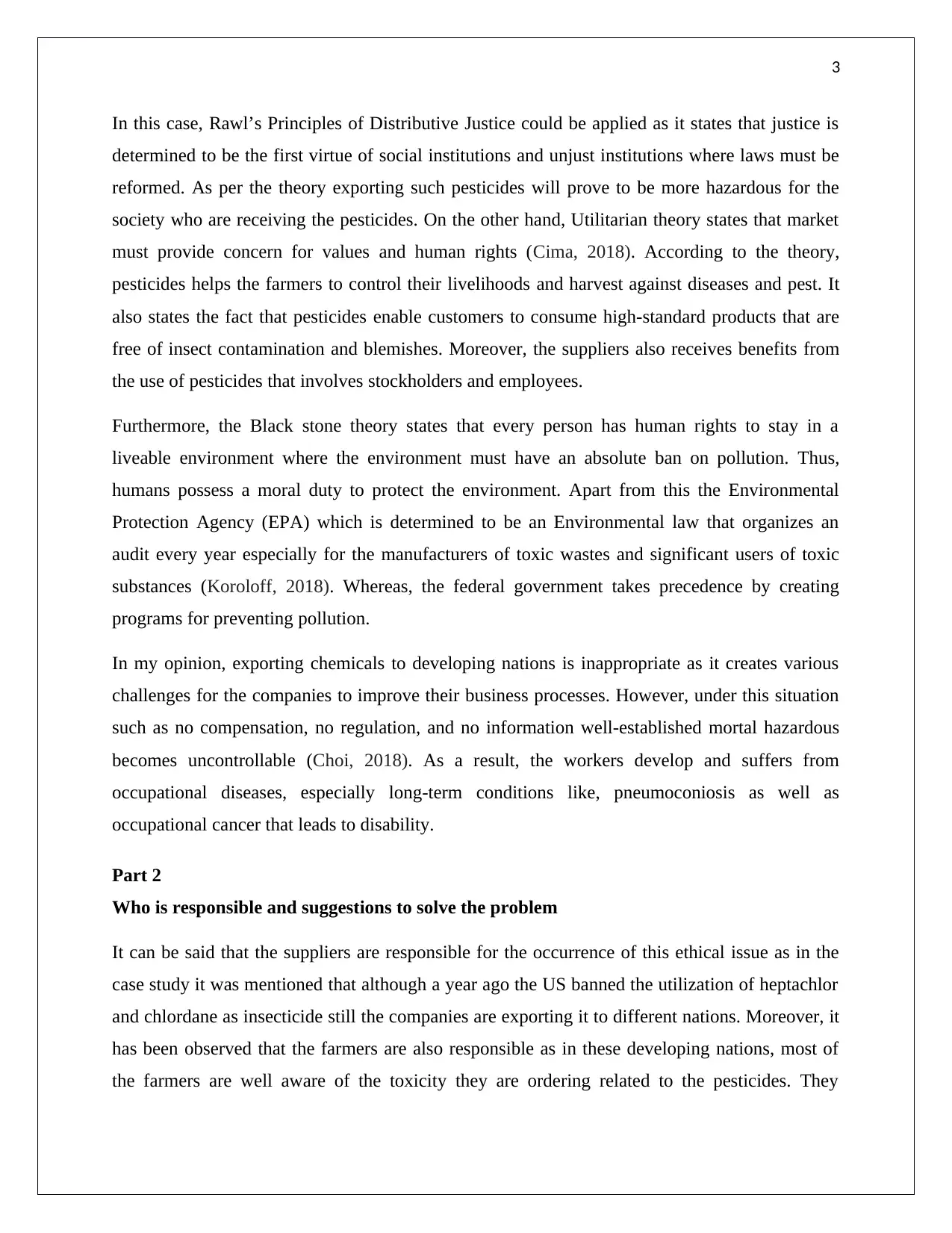
3
In this case, Rawl’s Principles of Distributive Justice could be applied as it states that justice is
determined to be the first virtue of social institutions and unjust institutions where laws must be
reformed. As per the theory exporting such pesticides will prove to be more hazardous for the
society who are receiving the pesticides. On the other hand, Utilitarian theory states that market
must provide concern for values and human rights (Cima, 2018). According to the theory,
pesticides helps the farmers to control their livelihoods and harvest against diseases and pest. It
also states the fact that pesticides enable customers to consume high-standard products that are
free of insect contamination and blemishes. Moreover, the suppliers also receives benefits from
the use of pesticides that involves stockholders and employees.
Furthermore, the Black stone theory states that every person has human rights to stay in a
liveable environment where the environment must have an absolute ban on pollution. Thus,
humans possess a moral duty to protect the environment. Apart from this the Environmental
Protection Agency (EPA) which is determined to be an Environmental law that organizes an
audit every year especially for the manufacturers of toxic wastes and significant users of toxic
substances (Koroloff, 2018). Whereas, the federal government takes precedence by creating
programs for preventing pollution.
In my opinion, exporting chemicals to developing nations is inappropriate as it creates various
challenges for the companies to improve their business processes. However, under this situation
such as no compensation, no regulation, and no information well-established mortal hazardous
becomes uncontrollable (Choi, 2018). As a result, the workers develop and suffers from
occupational diseases, especially long-term conditions like, pneumoconiosis as well as
occupational cancer that leads to disability.
Part 2
Who is responsible and suggestions to solve the problem
It can be said that the suppliers are responsible for the occurrence of this ethical issue as in the
case study it was mentioned that although a year ago the US banned the utilization of heptachlor
and chlordane as insecticide still the companies are exporting it to different nations. Moreover, it
has been observed that the farmers are also responsible as in these developing nations, most of
the farmers are well aware of the toxicity they are ordering related to the pesticides. They
In this case, Rawl’s Principles of Distributive Justice could be applied as it states that justice is
determined to be the first virtue of social institutions and unjust institutions where laws must be
reformed. As per the theory exporting such pesticides will prove to be more hazardous for the
society who are receiving the pesticides. On the other hand, Utilitarian theory states that market
must provide concern for values and human rights (Cima, 2018). According to the theory,
pesticides helps the farmers to control their livelihoods and harvest against diseases and pest. It
also states the fact that pesticides enable customers to consume high-standard products that are
free of insect contamination and blemishes. Moreover, the suppliers also receives benefits from
the use of pesticides that involves stockholders and employees.
Furthermore, the Black stone theory states that every person has human rights to stay in a
liveable environment where the environment must have an absolute ban on pollution. Thus,
humans possess a moral duty to protect the environment. Apart from this the Environmental
Protection Agency (EPA) which is determined to be an Environmental law that organizes an
audit every year especially for the manufacturers of toxic wastes and significant users of toxic
substances (Koroloff, 2018). Whereas, the federal government takes precedence by creating
programs for preventing pollution.
In my opinion, exporting chemicals to developing nations is inappropriate as it creates various
challenges for the companies to improve their business processes. However, under this situation
such as no compensation, no regulation, and no information well-established mortal hazardous
becomes uncontrollable (Choi, 2018). As a result, the workers develop and suffers from
occupational diseases, especially long-term conditions like, pneumoconiosis as well as
occupational cancer that leads to disability.
Part 2
Who is responsible and suggestions to solve the problem
It can be said that the suppliers are responsible for the occurrence of this ethical issue as in the
case study it was mentioned that although a year ago the US banned the utilization of heptachlor
and chlordane as insecticide still the companies are exporting it to different nations. Moreover, it
has been observed that the farmers are also responsible as in these developing nations, most of
the farmers are well aware of the toxicity they are ordering related to the pesticides. They
Paraphrase This Document
Need a fresh take? Get an instant paraphrase of this document with our AI Paraphraser
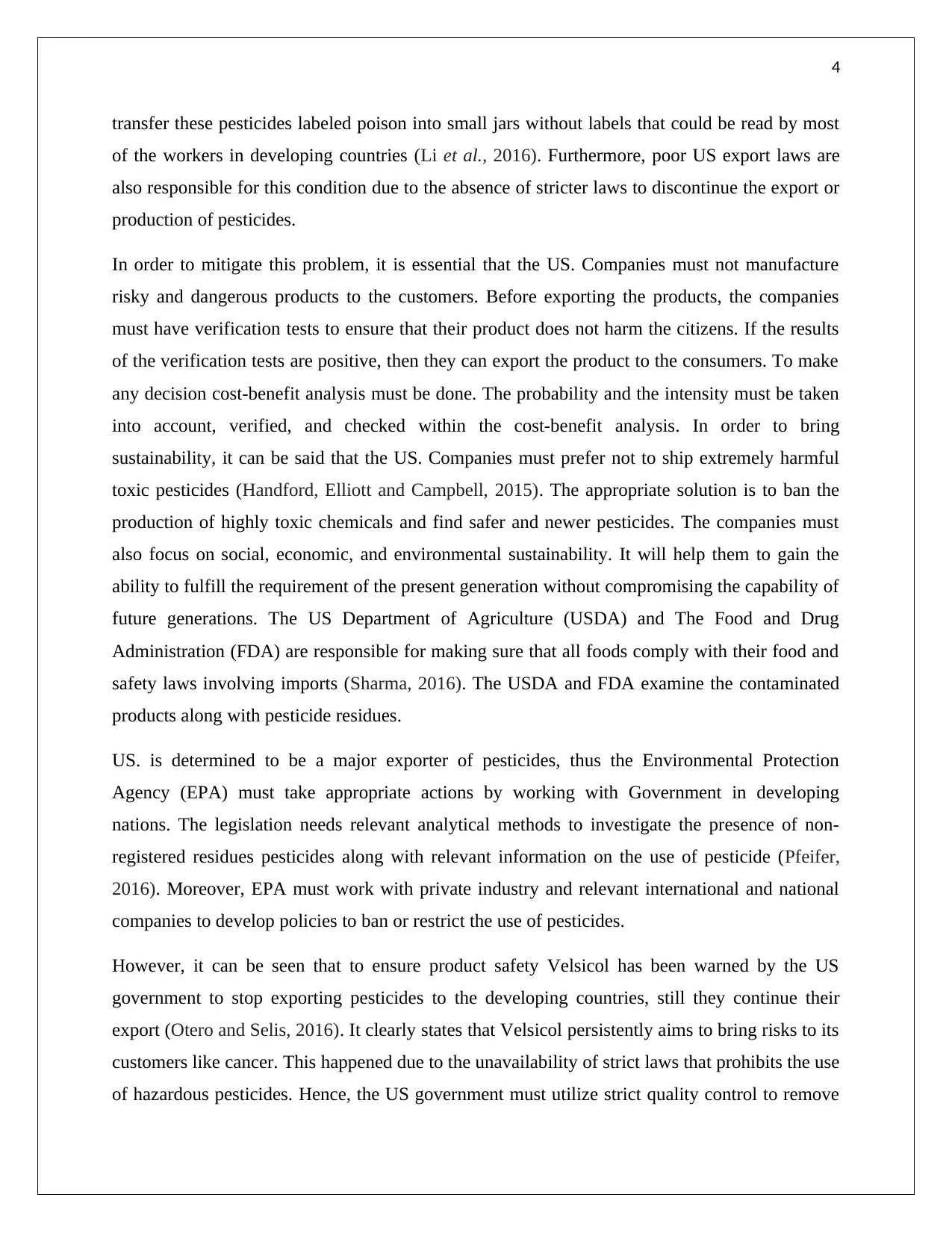
4
transfer these pesticides labeled poison into small jars without labels that could be read by most
of the workers in developing countries (Li et al., 2016). Furthermore, poor US export laws are
also responsible for this condition due to the absence of stricter laws to discontinue the export or
production of pesticides.
In order to mitigate this problem, it is essential that the US. Companies must not manufacture
risky and dangerous products to the customers. Before exporting the products, the companies
must have verification tests to ensure that their product does not harm the citizens. If the results
of the verification tests are positive, then they can export the product to the consumers. To make
any decision cost-benefit analysis must be done. The probability and the intensity must be taken
into account, verified, and checked within the cost-benefit analysis. In order to bring
sustainability, it can be said that the US. Companies must prefer not to ship extremely harmful
toxic pesticides (Handford, Elliott and Campbell, 2015). The appropriate solution is to ban the
production of highly toxic chemicals and find safer and newer pesticides. The companies must
also focus on social, economic, and environmental sustainability. It will help them to gain the
ability to fulfill the requirement of the present generation without compromising the capability of
future generations. The US Department of Agriculture (USDA) and The Food and Drug
Administration (FDA) are responsible for making sure that all foods comply with their food and
safety laws involving imports (Sharma, 2016). The USDA and FDA examine the contaminated
products along with pesticide residues.
US. is determined to be a major exporter of pesticides, thus the Environmental Protection
Agency (EPA) must take appropriate actions by working with Government in developing
nations. The legislation needs relevant analytical methods to investigate the presence of non-
registered residues pesticides along with relevant information on the use of pesticide (Pfeifer,
2016). Moreover, EPA must work with private industry and relevant international and national
companies to develop policies to ban or restrict the use of pesticides.
However, it can be seen that to ensure product safety Velsicol has been warned by the US
government to stop exporting pesticides to the developing countries, still they continue their
export (Otero and Selis, 2016). It clearly states that Velsicol persistently aims to bring risks to its
customers like cancer. This happened due to the unavailability of strict laws that prohibits the use
of hazardous pesticides. Hence, the US government must utilize strict quality control to remove
transfer these pesticides labeled poison into small jars without labels that could be read by most
of the workers in developing countries (Li et al., 2016). Furthermore, poor US export laws are
also responsible for this condition due to the absence of stricter laws to discontinue the export or
production of pesticides.
In order to mitigate this problem, it is essential that the US. Companies must not manufacture
risky and dangerous products to the customers. Before exporting the products, the companies
must have verification tests to ensure that their product does not harm the citizens. If the results
of the verification tests are positive, then they can export the product to the consumers. To make
any decision cost-benefit analysis must be done. The probability and the intensity must be taken
into account, verified, and checked within the cost-benefit analysis. In order to bring
sustainability, it can be said that the US. Companies must prefer not to ship extremely harmful
toxic pesticides (Handford, Elliott and Campbell, 2015). The appropriate solution is to ban the
production of highly toxic chemicals and find safer and newer pesticides. The companies must
also focus on social, economic, and environmental sustainability. It will help them to gain the
ability to fulfill the requirement of the present generation without compromising the capability of
future generations. The US Department of Agriculture (USDA) and The Food and Drug
Administration (FDA) are responsible for making sure that all foods comply with their food and
safety laws involving imports (Sharma, 2016). The USDA and FDA examine the contaminated
products along with pesticide residues.
US. is determined to be a major exporter of pesticides, thus the Environmental Protection
Agency (EPA) must take appropriate actions by working with Government in developing
nations. The legislation needs relevant analytical methods to investigate the presence of non-
registered residues pesticides along with relevant information on the use of pesticide (Pfeifer,
2016). Moreover, EPA must work with private industry and relevant international and national
companies to develop policies to ban or restrict the use of pesticides.
However, it can be seen that to ensure product safety Velsicol has been warned by the US
government to stop exporting pesticides to the developing countries, still they continue their
export (Otero and Selis, 2016). It clearly states that Velsicol persistently aims to bring risks to its
customers like cancer. This happened due to the unavailability of strict laws that prohibits the use
of hazardous pesticides. Hence, the US government must utilize strict quality control to remove
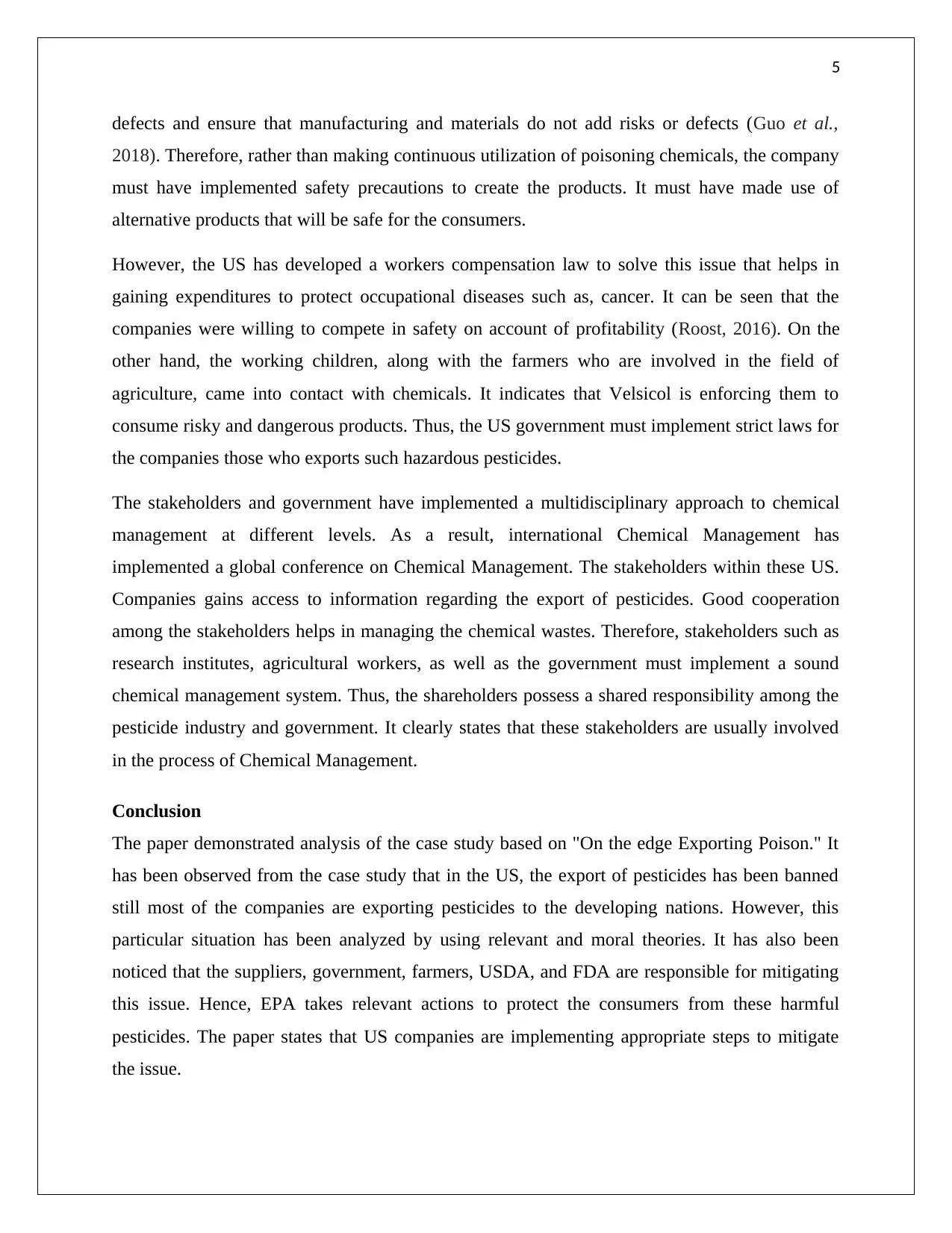
5
defects and ensure that manufacturing and materials do not add risks or defects (Guo et al.,
2018). Therefore, rather than making continuous utilization of poisoning chemicals, the company
must have implemented safety precautions to create the products. It must have made use of
alternative products that will be safe for the consumers.
However, the US has developed a workers compensation law to solve this issue that helps in
gaining expenditures to protect occupational diseases such as, cancer. It can be seen that the
companies were willing to compete in safety on account of profitability (Roost, 2016). On the
other hand, the working children, along with the farmers who are involved in the field of
agriculture, came into contact with chemicals. It indicates that Velsicol is enforcing them to
consume risky and dangerous products. Thus, the US government must implement strict laws for
the companies those who exports such hazardous pesticides.
The stakeholders and government have implemented a multidisciplinary approach to chemical
management at different levels. As a result, international Chemical Management has
implemented a global conference on Chemical Management. The stakeholders within these US.
Companies gains access to information regarding the export of pesticides. Good cooperation
among the stakeholders helps in managing the chemical wastes. Therefore, stakeholders such as
research institutes, agricultural workers, as well as the government must implement a sound
chemical management system. Thus, the shareholders possess a shared responsibility among the
pesticide industry and government. It clearly states that these stakeholders are usually involved
in the process of Chemical Management.
Conclusion
The paper demonstrated analysis of the case study based on "On the edge Exporting Poison." It
has been observed from the case study that in the US, the export of pesticides has been banned
still most of the companies are exporting pesticides to the developing nations. However, this
particular situation has been analyzed by using relevant and moral theories. It has also been
noticed that the suppliers, government, farmers, USDA, and FDA are responsible for mitigating
this issue. Hence, EPA takes relevant actions to protect the consumers from these harmful
pesticides. The paper states that US companies are implementing appropriate steps to mitigate
the issue.
defects and ensure that manufacturing and materials do not add risks or defects (Guo et al.,
2018). Therefore, rather than making continuous utilization of poisoning chemicals, the company
must have implemented safety precautions to create the products. It must have made use of
alternative products that will be safe for the consumers.
However, the US has developed a workers compensation law to solve this issue that helps in
gaining expenditures to protect occupational diseases such as, cancer. It can be seen that the
companies were willing to compete in safety on account of profitability (Roost, 2016). On the
other hand, the working children, along with the farmers who are involved in the field of
agriculture, came into contact with chemicals. It indicates that Velsicol is enforcing them to
consume risky and dangerous products. Thus, the US government must implement strict laws for
the companies those who exports such hazardous pesticides.
The stakeholders and government have implemented a multidisciplinary approach to chemical
management at different levels. As a result, international Chemical Management has
implemented a global conference on Chemical Management. The stakeholders within these US.
Companies gains access to information regarding the export of pesticides. Good cooperation
among the stakeholders helps in managing the chemical wastes. Therefore, stakeholders such as
research institutes, agricultural workers, as well as the government must implement a sound
chemical management system. Thus, the shareholders possess a shared responsibility among the
pesticide industry and government. It clearly states that these stakeholders are usually involved
in the process of Chemical Management.
Conclusion
The paper demonstrated analysis of the case study based on "On the edge Exporting Poison." It
has been observed from the case study that in the US, the export of pesticides has been banned
still most of the companies are exporting pesticides to the developing nations. However, this
particular situation has been analyzed by using relevant and moral theories. It has also been
noticed that the suppliers, government, farmers, USDA, and FDA are responsible for mitigating
this issue. Hence, EPA takes relevant actions to protect the consumers from these harmful
pesticides. The paper states that US companies are implementing appropriate steps to mitigate
the issue.
⊘ This is a preview!⊘
Do you want full access?
Subscribe today to unlock all pages.

Trusted by 1+ million students worldwide

6
Paraphrase This Document
Need a fresh take? Get an instant paraphrase of this document with our AI Paraphraser
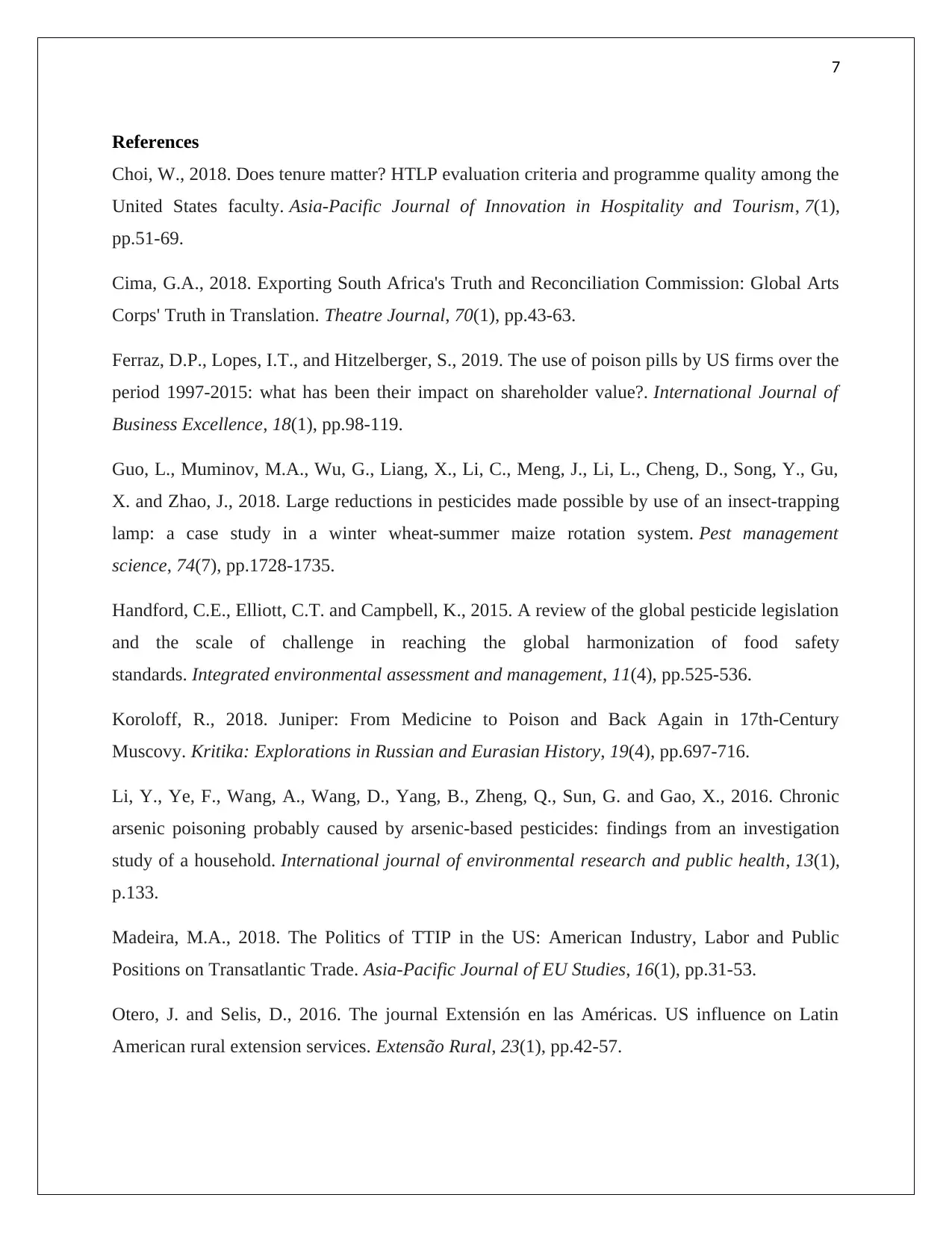
7
References
Choi, W., 2018. Does tenure matter? HTLP evaluation criteria and programme quality among the
United States faculty. Asia-Pacific Journal of Innovation in Hospitality and Tourism, 7(1),
pp.51-69.
Cima, G.A., 2018. Exporting South Africa's Truth and Reconciliation Commission: Global Arts
Corps' Truth in Translation. Theatre Journal, 70(1), pp.43-63.
Ferraz, D.P., Lopes, I.T., and Hitzelberger, S., 2019. The use of poison pills by US firms over the
period 1997-2015: what has been their impact on shareholder value?. International Journal of
Business Excellence, 18(1), pp.98-119.
Guo, L., Muminov, M.A., Wu, G., Liang, X., Li, C., Meng, J., Li, L., Cheng, D., Song, Y., Gu,
X. and Zhao, J., 2018. Large reductions in pesticides made possible by use of an insect‐trapping
lamp: a case study in a winter wheat‐summer maize rotation system. Pest management
science, 74(7), pp.1728-1735.
Handford, C.E., Elliott, C.T. and Campbell, K., 2015. A review of the global pesticide legislation
and the scale of challenge in reaching the global harmonization of food safety
standards. Integrated environmental assessment and management, 11(4), pp.525-536.
Koroloff, R., 2018. Juniper: From Medicine to Poison and Back Again in 17th-Century
Muscovy. Kritika: Explorations in Russian and Eurasian History, 19(4), pp.697-716.
Li, Y., Ye, F., Wang, A., Wang, D., Yang, B., Zheng, Q., Sun, G. and Gao, X., 2016. Chronic
arsenic poisoning probably caused by arsenic-based pesticides: findings from an investigation
study of a household. International journal of environmental research and public health, 13(1),
p.133.
Madeira, M.A., 2018. The Politics of TTIP in the US: American Industry, Labor and Public
Positions on Transatlantic Trade. Asia-Pacific Journal of EU Studies, 16(1), pp.31-53.
Otero, J. and Selis, D., 2016. The journal Extensión en las Américas. US influence on Latin
American rural extension services. Extensão Rural, 23(1), pp.42-57.
References
Choi, W., 2018. Does tenure matter? HTLP evaluation criteria and programme quality among the
United States faculty. Asia-Pacific Journal of Innovation in Hospitality and Tourism, 7(1),
pp.51-69.
Cima, G.A., 2018. Exporting South Africa's Truth and Reconciliation Commission: Global Arts
Corps' Truth in Translation. Theatre Journal, 70(1), pp.43-63.
Ferraz, D.P., Lopes, I.T., and Hitzelberger, S., 2019. The use of poison pills by US firms over the
period 1997-2015: what has been their impact on shareholder value?. International Journal of
Business Excellence, 18(1), pp.98-119.
Guo, L., Muminov, M.A., Wu, G., Liang, X., Li, C., Meng, J., Li, L., Cheng, D., Song, Y., Gu,
X. and Zhao, J., 2018. Large reductions in pesticides made possible by use of an insect‐trapping
lamp: a case study in a winter wheat‐summer maize rotation system. Pest management
science, 74(7), pp.1728-1735.
Handford, C.E., Elliott, C.T. and Campbell, K., 2015. A review of the global pesticide legislation
and the scale of challenge in reaching the global harmonization of food safety
standards. Integrated environmental assessment and management, 11(4), pp.525-536.
Koroloff, R., 2018. Juniper: From Medicine to Poison and Back Again in 17th-Century
Muscovy. Kritika: Explorations in Russian and Eurasian History, 19(4), pp.697-716.
Li, Y., Ye, F., Wang, A., Wang, D., Yang, B., Zheng, Q., Sun, G. and Gao, X., 2016. Chronic
arsenic poisoning probably caused by arsenic-based pesticides: findings from an investigation
study of a household. International journal of environmental research and public health, 13(1),
p.133.
Madeira, M.A., 2018. The Politics of TTIP in the US: American Industry, Labor and Public
Positions on Transatlantic Trade. Asia-Pacific Journal of EU Studies, 16(1), pp.31-53.
Otero, J. and Selis, D., 2016. The journal Extensión en las Américas. US influence on Latin
American rural extension services. Extensão Rural, 23(1), pp.42-57.
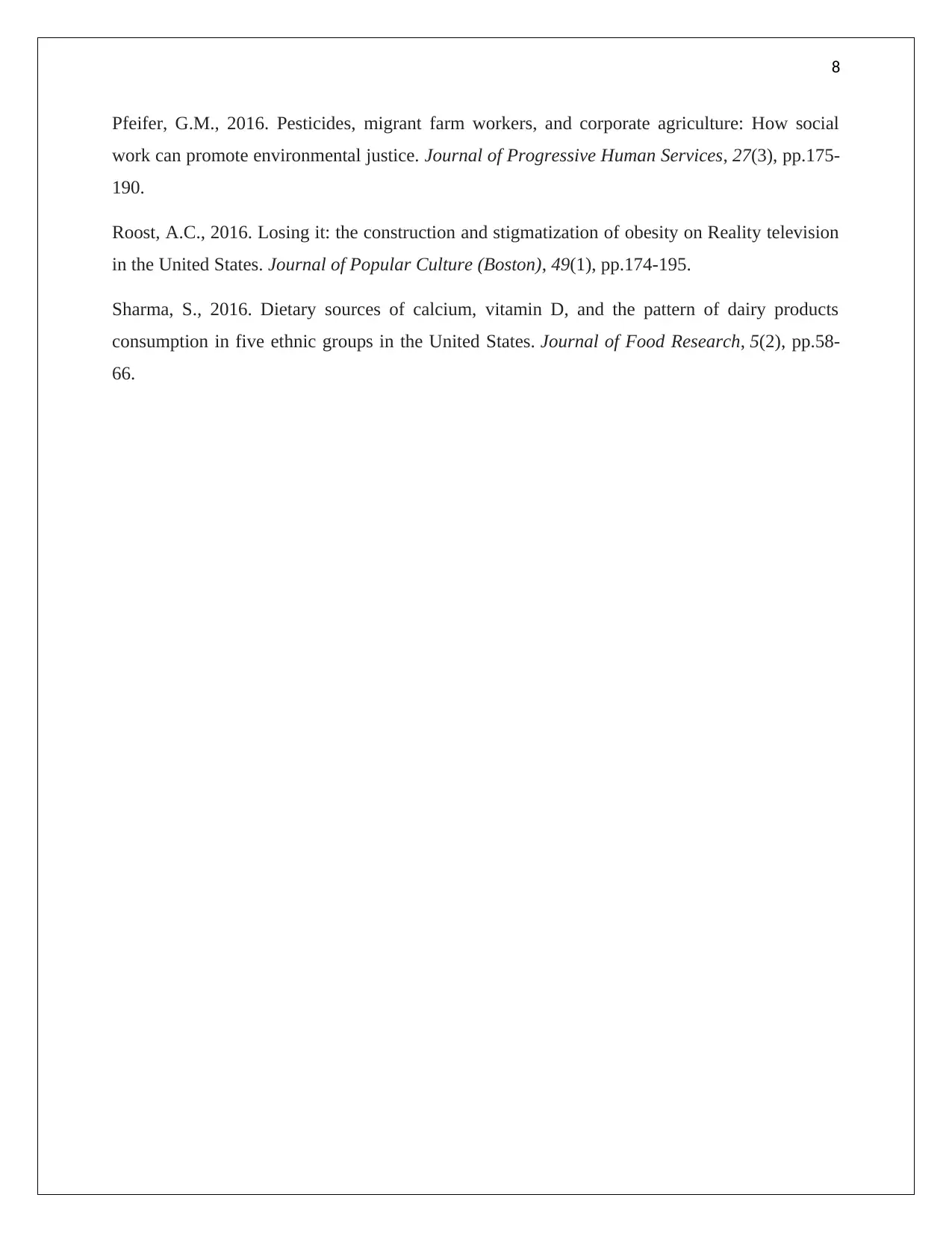
8
Pfeifer, G.M., 2016. Pesticides, migrant farm workers, and corporate agriculture: How social
work can promote environmental justice. Journal of Progressive Human Services, 27(3), pp.175-
190.
Roost, A.C., 2016. Losing it: the construction and stigmatization of obesity on Reality television
in the United States. Journal of Popular Culture (Boston), 49(1), pp.174-195.
Sharma, S., 2016. Dietary sources of calcium, vitamin D, and the pattern of dairy products
consumption in five ethnic groups in the United States. Journal of Food Research, 5(2), pp.58-
66.
Pfeifer, G.M., 2016. Pesticides, migrant farm workers, and corporate agriculture: How social
work can promote environmental justice. Journal of Progressive Human Services, 27(3), pp.175-
190.
Roost, A.C., 2016. Losing it: the construction and stigmatization of obesity on Reality television
in the United States. Journal of Popular Culture (Boston), 49(1), pp.174-195.
Sharma, S., 2016. Dietary sources of calcium, vitamin D, and the pattern of dairy products
consumption in five ethnic groups in the United States. Journal of Food Research, 5(2), pp.58-
66.
⊘ This is a preview!⊘
Do you want full access?
Subscribe today to unlock all pages.

Trusted by 1+ million students worldwide
1 out of 9
Related Documents
Your All-in-One AI-Powered Toolkit for Academic Success.
+13062052269
info@desklib.com
Available 24*7 on WhatsApp / Email
![[object Object]](/_next/static/media/star-bottom.7253800d.svg)
Unlock your academic potential
Copyright © 2020–2025 A2Z Services. All Rights Reserved. Developed and managed by ZUCOL.




